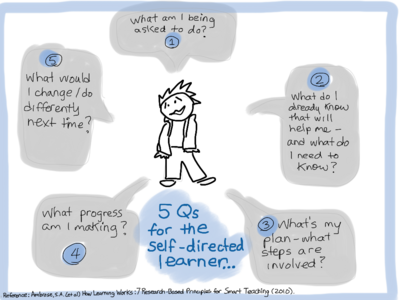Learning Commons:Content/Learning Challenges/Keeping Up
The Problem
Keeping up with all of the work expected of you at university can be challenging. Between classes and readings and assignments sometimes it feels like there aren’t enough hours in the day to get everything done. You are not alone in this feeling. The workload increases dramatically from high school to university, and you no longer have your parents keeping on top of you to get things done. This means that it is important to plan well and to use your time effectively by avoiding procrastination as much as possible. But it’s also important to stay healthy and to leave time for having fun as well as studying. Some issues that might be impacting your feeling of being overwhelmed are:
Reading everything
Generally a syllabus is divided into required readings and recommended readings. It is next to impossible to read every single article or book mentioned by your professor, and trying to will lead to feelings of burnout and falling behind. You will need to find ways to deal with reading overload by determining which articles and texts are the most deserving of your attention.
Not going to class
Every student makes decisions about whether or not to go to class, after all most profs don't take attendance like teachers did in high school. But remember that missing too many classes can be de-motivating, especially if you are missing important lectures or learning activities that help you make sense of the course content. While classes generally are a big time commitment, not going will likely cause you to fall more behind and actually increase your stress. Just copying a friends notes won't truly help you engage with the content and classes are also an excellent time to ask questions if something is confusing.
Not writing things down
While you may have been able to get through high school without taking notes, most profs don't provide handouts that outline the important points of a given lecture. This means that you need to determine for yourself what information is important and write it down. This is especially true when details are given in class about assignments and tests, as many teachers will not continually remind you that an upcoming assignment is due. Staying organized is key to success in university!
Waiting too long to seek help
This is a common mistake for first year students who are often nervous about meeting with their profs outside of class. You may feel like you will be judged or that your questions are stupid. It may be helpful to know that your questions will likely not be new to your professors - they've probably heard it before from previous students and can therefore offer some immediate and specific advice to help you. Remember that your professors and TAs are there to help you learn and they want to see you succeed.
The Myths
The following myths about learning are relevant to the challenge of keeping up with your work.
Myth 2: I only need one good method for studying.
Sometimes, study methods that worked in high school - just don't serve you well in university. If your tried and true study strategies aren't working, use a different approach. Monitor your learning, by measuring your knowledge against what you expect. Before you start studying, guess how it'll go. Predict your homework and test results, and see if you're accurate or not. Notice when your expectations fall short of (or overshoot) reality, and adjust your approach accordingly. This is called metacognition, and it's an important part of effective learning.
There's also some evidence to suggest that mixing it up (in terms of where, when and how we study and learn) promotes recall (Carey, 2015)
|
Myth 5: Planning is a waste of time.

Being a self-directed learner requires planning.
Answering the 5 questions from the graphic above can help to build a disciplined approach which will help you tackle your academic work.
Planning can also help you develop a workable schedule for studying. "Research shows spacing study episodes out with breaks in between study sessions or repetitions of the same material is more effective than massing such study episodes. Massing practice is akin to cramming all night before the test." (Clark and Bjork, 2014).
Planning reduces stress, helps you avoid cramming, and builds skills in metacognition. Planning is an important part of any career or occupation, so learning to plan well contributes to your overall competency. Even learning to plan takes practice, so start early!
Reference:
- Clark, C.M., Bjork, R.A. (2014) When and Why Introducing Difficulties and Errors Can Enhance Instruction, in Benassi, V. A., Overson, C. E., & Hakala, C. M. (Editors). (2014). Applying science of learning in education: Infusing psychological science into the curriculum. Available at the Teaching of Psychology website: http://teachpsych.org/ebooks/asle2014/index.php.
The Strategies
|
The Toolkits
Check out some of our student toolkits to support your learning:
The Links
- Maclean's Magazine Ten Things I Wish I'd Known in my First Year of University
- Life Hack Freshman 15: Coping with the First Year of College
- Optimizing Learning in College: Tips from Cognitive Psychology
Videos
- Wellcast: How to Stop Procrastinating
- College Info Geek: How to Deal with Student Burnout
- College Info Geek: 5 Ways to Build Focus and Concentration
Health and Wellness at UBC: